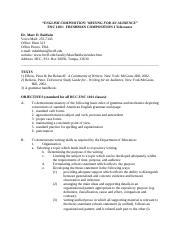

The journals are meant to support notions central to the paper topics, as well as reinforce helpful reading and writing practices. Paper 3 provides students with an opportunity to display a fuller understanding of how media and language affect their everyday lives (including academic lives) by entering into and re-directing the influence that media/language has on them.
#MCGRAW HILL ENGLISH 1101 HOW TO#
Paper 2 then allows students to see new external instances (and how these media are connected) and learn how to deal with those instances. Paper 1 allows students to learn how they have already been engaged and have internalized these media. The papers are intended to build upon each other, allowing students to understand just how pervasive this influence of language through text or other media, especially visual media, is, and how deeply they are affected by it. Incorporating images and media into this study of language is integral to the students’ understanding of the scope of language. Students will also see the effects of writing and text on their decision making processes and learn how to best utilize those practices that create those effects in their thinking and writing. More specifically, in this course we want to focus on the power of language-the discovery of what happens when we use language (properly and improperly) and what happens when disparate media use language on us. You will write and revise three papers, write sustained exploratory journals, devise your own purposes and structures for those papers, work directly with the audience of your peers to practice critical reading and response, and learn many new writing techniques. This course aims to help you improve your writing skills in all areas: discovering what you have to say, organizing your thoughts for a variety of audiences, and improving fluency and rhetorical sophistication.
#MCGRAW HILL ENGLISH 1101 FREE#
If you would like further information regarding FSU's First-Year Composition Program, feel free to contact the program director, Dr. With an emphasis on in-class discussions and workshops, First-Year Composition courses facilitate critical understandings between reading and composing. Learning from each other and from their teachers, students are invited to give thoughtful, reasoned responses to both assigned readings and the compositions of their peers. Students are expected to be active participants in the classroom community.

Students should expect frequent written and oral response on the content of their writing from both teachers and peers. Since writing is a process of making meaning as well as communicating, First-Year Composition teachers respond to the content of students' writing as well as to surface errors. Writing is both personal and social, and students should learn how to write for a variety of purposes and audiences. Monday-Thursday 3:00 PM – 4:30 PM Diffenbaugh 236Įmail: Year Composition Mission Statementįirst-Year Composition courses at Florida State University teach writing as a recursive and frequently collaborative process of invention, drafting, and revising. Writing For Your Moment – Multi-Genre, Audience and Voice


 0 kommentar(er)
0 kommentar(er)
